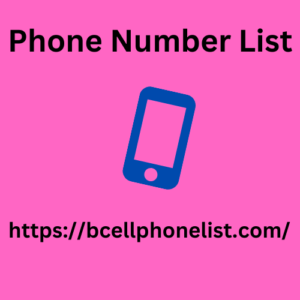Choosing the best cloud-based database solution depends on various factors, including your Albania Mobile Phone specific needs, data volume, budget, and technical expertise. Here are some key considerations:
1. Data Type and Structure:
- Relational (RDBMS): Suitable for structured data with defined relationships (e.g., MySQL, PostgreSQL).
- NoSQL: Ideal for unstructured or semi-structured data (e.g., MongoDB, Cassandra, DynamoDB).
- Data Warehouse: Designed for large datasets and complex analytics (e.g., Redshift, BigQuery).
- Graph: Best for representing relationships and networks (e.g., Neo4j, ArangoDB).
2. Scalability and Performance:
- Dynamic Scaling: Consider how easily the database can scale up or down to accommodate changing workloads.
- Query Performance: Evaluate the database’s performance for your specific query patterns.
- Latency: Assess the database’s latency for real-time applications.
3. Cost:
- Pricing Models: Compare pricing models (e.g., pay-as-you-go, reserved instances) and total cost of ownership.
- Hidden Costs: Factor in additional costs like data transfer fees, storage costs, and support fees.
4. Security and Compliance:
- Data Encryption: Ensure the database offers robust data encryption at rest and in transit.
- Access Controls: Evaluate the database’s access control mechanisms to protect sensitive data.
- Compliance: Check if the database meets industry-specific compliance standards (e.g., HIPAA, GDPR).
5. Integration and Ecosystem:
- Integration with Other Tools: Consider how easily the database integrates Albania Mobile Phone Numbers Database with your existing tools and applications.
- Ecosystem: Evaluate the availability of third-party tools, connectors, and support resources.
6. Technical Expertise:
- Internal Resources: Assess your team’s expertise in managing the chosen database technology.
- Managed Services: Consider using managed services if you lack internal expertise.
7. Vendor Reputation and Support:
- Reliability: Research the vendor’s reputation for reliability and uptime.
- Support: Evaluate the quality and availability of technical support.
Additional Tips:
- Conduct Proof of Concepts (PoCs): Test different databases with your specific workloads to assess performance and suitability.
- Consider Future Needs: Anticipate your future data needs and choose a database For those with technical expertise that can accommodate growth.
- Evaluate Vendor Roadmap: Research the vendor’s roadmap for future features and enhancements.
By carefully considering these factors, you can choose the cloud-based database solution that best aligns with your organization’s requirements and goals.



